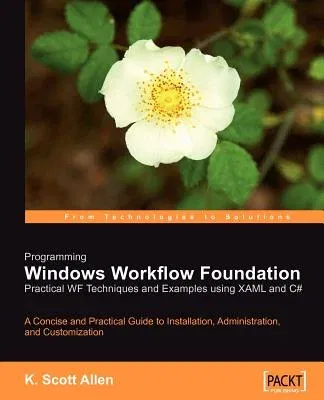A fast-paced and practical developer's road map to working with Windows
WF, from compilation to the base activity library to runtime services.
Windows Workflow Foundation (WF) is a technology for defining,
executing, and managing workflows. It is part of the .NET Framework 3.0
and will be available natively in the Windows Vista operating system.
Windows Workflow Foundation might be the most significant piece of
middleware to arrive on the Windows platform since COM+ and the
Distributed Transaction Coordinator. The difference is, not every
application needs a distributed transaction, but nearly every
application does have a workflow encoded inside it. In this book, K
Scott Allen, author of renowned .NET articles at www.odetocode.com,
provides you with all the information needed to develop successful
products with Windows Workflow. From the basics of how Windows Workflow
can solve the difficult problems inherent in workflow solutions, through
authoring workflows in code, learning about the base activity library in
Windows Workflow and the different types of workflow provided, and on to
building event-driven workflows using state machines, workflow
communications, and finally rules and conditions in Windows Workflow,
this book will give you the in-depth information you need. Throughout
the book, an example "bug reporting" workflow system is developed,
showcasing the technology and techniques used. Fast-paced and
to-the-point, this book takes you through the important topics of
Windows WF development with clear explanations and practical example
code. The book's selection of topics is driven by what the working
developer needs to know. It is neither a comprehensive reference to the
whole WF architecture, nor a strategy guide to the complete application
development lifecycle. It's just what you as a C# developer need to know
to use WF in your applications. This book is for .NET developers who
want to enhance their applications with flexible workflow capabilities
using Microsoft Windows Workflow Foundation. The author assumes that you
have read other texts on the overall architecture of WF and on WF
application design strategies, and instead focuses on real-work
implementation issues for C# developers.


